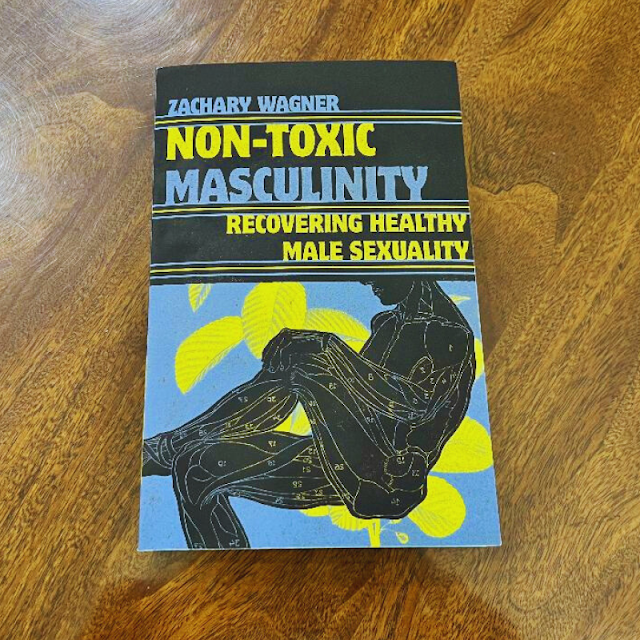Non-Toxic Masculinity: Recovering Healthy Male Sexuality by Zachary Wagner (IVP Academic 2023) is a denunciation of purity culture in the white evangelical church and a plea for the church to adopt teaching on sexuality that is redemptive and grace-filled.
Right off the bat in this review I should mention one thing that I found a little jarring: the author uses progressive words and phrases when discussing sexuality. Examples: "cisgendered" is used multiple times. Wagner asks readers whether it is reasonable to expect "Queer Christians" (his term) to remain chaste (pages 40, 41). He uses the phrase "male privilege" (page 45) and "male gaze" (page 47) in a section on patriarchy. This is concerning from my perspective, because Christians who adopt the preferred language of liberation movements generally end up viewing all issues through the oppressor/victim lens. And before long they minimize or abandon scriptural teaching in favor of progressive views on the issues.
I did not expect to find this in a book published by InterVarsity Press, the publishing company that carried titles in a previous generation by evangelical titans like John Stott and J.I. Packer. What is going on? I wondered if this would turn out to be a book on deconstruction.
And speaking of progressive perspectives, what is Wagner's view on transgenderism? He doesn't address that issue in the body of the book but you can get a glimpse into Wagner's thought process in the footnotes to chapter 14: "I also acknowledge that some people who identify as men may not have the same reproductive capacities of cisgendered men." (pages 211, 212.) What could Wagner possibly mean by that sentence other than, "females who think they are males don't have penises that deliver sperm"? That Wagner writes such a contorted sentence makes me wonder if he is more captive to trans and leftist perspectives than biblical perspectives.
More humorous than concerning, some of the material has a vibe of "Men Need To Be Confident Enough In Their Masculinity To Carry An NPR Tote Bag." The section on fighting traditional Western male stereotypes (beginning on page 49) is unintentionally comical. I imagined the following sentences (pages 49 and 50) in the voice of Michael Scott (The Office):
Many of our most cherished artists and fictional characters are in touch with their emotions. What would we say about Lin-Manuel Miranda's Alexander Hamilton? Or William Shakespeare's love sonnets. Are these men less manly for having emotions?
Anyway, back to the progressive-sounding lingo. I wonder who the target audience is. As a veteran of lots of evangelical small groups and men's retreats over the decades, I can assert that conservative evangelical men do not use words and phrases like cisgender, Queer Christians, male gaze, etc. Is the author really trying to appeal to the average man in the pews of evangelical churches?
I should mention one facet of the author's writing style that I found weak: Wagner gets overwrought a lot. For example, he says that evangelicals "worship" sex (pages 42, 162). Why exaggerate and be dramatic? When it comes to discussing important issues, Tim Keller famously said when you are discussing an issue, never attribute an opinion to your opponents that they themselves do not own. Well, no evangelical would affirm a charge that they worship sex. It is preposterous, and this assertion won't persuade evangelicals to consider Wagner's views. Going over-the-top like this may highlight an immaturity on the author's part.
A final complaint: Wagner moves into feminist critique territory in Chapter three in a discussion about the fairy tales and films that young American boys and girls watch. But he's not talking about fairy tales with sexual themes or violence; Wagner singles out Prince Charming and Mel Gibson's Braveheart as promoting harmful ideas about sexual relationships. From page 53:
Sexual conquest is characteristic of all manner of male heroes and role models... Even Prince Charming, whom many claim as the paragon of Western masculine virtue, isn't free from this trait. The rescue of the princess in a tower, the slaying of the dragon, and every other western trope of masculine heroism often implies a type of sexual conquest. While the sexual subtext of fairy tales is not stated explicitly, the implication is that the knight's (violent) heroism gains him access to the sexual affections of the princess.
I don't think that feminist critiques (like his perspective that the Prince Charming story is harmful because it implies the knight's sexual conquest of the princess) will be taken seriously by non-feminists.
It turns out this isn't a book on deconstruction, thankfully. I hope I haven't been too critical in this review because Wagner certainly does identify some positive recommendations to bring to teaching sexuality in the church. Some of his solid contributions: Wagner puts responsibility for male sexuality squarely where it belongs: on the male. Wagner also emphasizes women should never be blamed for the sins of men, no matter what they were wearing. He brings grace into the discussion on sexuality, saying a focus on rules and pledges and accountability groups (which usually lead to shame and isolation and men being stuck in immaturity) are not effective in leading to maturity. The best way forward for men, Wagner says, is authentic community where men can grow into godliness and maturity.
So Non-Toxic Masculinity has some good recommendations for the church to consider regarding teaching on sexuality. It's unfortunate so much of the material is framed in the language of liberation ideologies rather than scripture. Three out of five stars.
